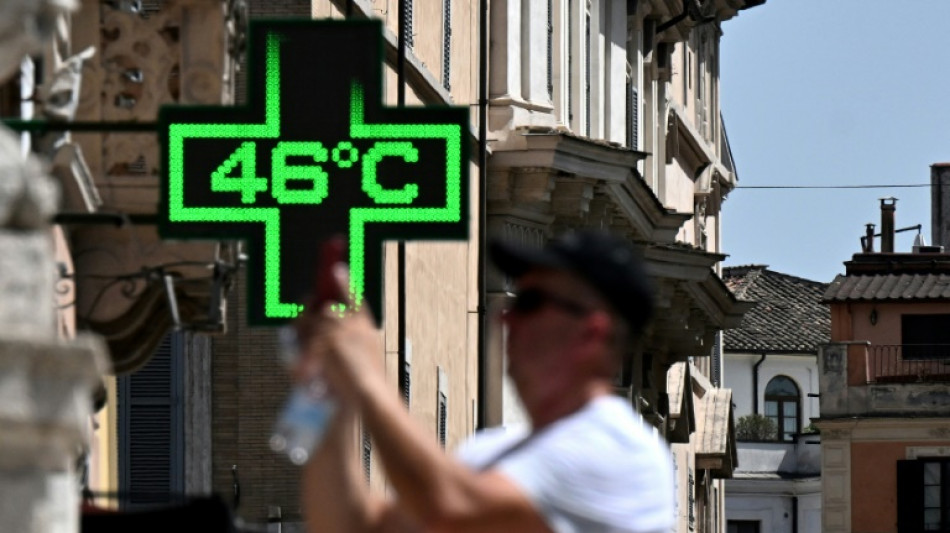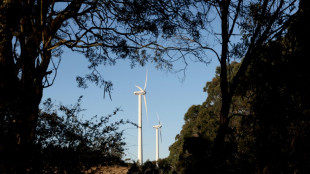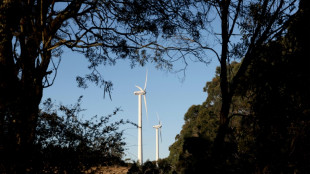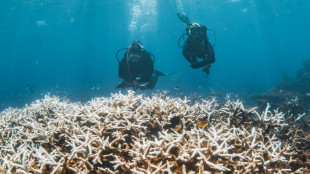
-
 Iran, US hold new round of high-stakes nuclear talks
Iran, US hold new round of high-stakes nuclear talks
-
Up at dawn for front-row seat to history at Francis's funeral

-
 Pakistan ready to 'defend sovereignty' after India threats
Pakistan ready to 'defend sovereignty' after India threats
-
Huge crowds flock to Vatican for Pope Francis's funeral

-
 Xi says China must 'overcome' AI chip challenges
Xi says China must 'overcome' AI chip challenges
-
Indian army says new exchange of gunfire with Pakistan

-
 Epstein accuser Virginia Giuffre takes own life in Australia: family
Epstein accuser Virginia Giuffre takes own life in Australia: family
-
Hundreds of buildings damaged, dozens injured in 6.3 Ecuador quake

-
 India and Pakistan's Kashmir fallout hits economy too
India and Pakistan's Kashmir fallout hits economy too
-
Francis's funeral to be grand farewell to 'pope of the poor'

-
 Pogacar faces defiant Evenepoel at Liege-Bastogne-Liege
Pogacar faces defiant Evenepoel at Liege-Bastogne-Liege
-
Chelsea eye great escape against Barcelona in Women's Champions League

-
 Iran, US to hold new round of high-level nuclear talks
Iran, US to hold new round of high-level nuclear talks
-
'Energy and effort' pay off for Reds as Blues' woes continue

-
 Albatross and closing birdie lift China's Liu to LPGA Chevron lead
Albatross and closing birdie lift China's Liu to LPGA Chevron lead
-
On the horizon? Wave of momentum for high seas treaty

-
 Top Mistakes to Avoid When Building Credit History
Top Mistakes to Avoid When Building Credit History
-
Developing countries should fast-track US trade deals: World Bank president

-
 Grizzlies' Morant 'doubtful' for must-win game 4 v Thunder
Grizzlies' Morant 'doubtful' for must-win game 4 v Thunder
-
Trump in Rome for pope funeral in first foreign trip of new term

-
 Trump says Russia-Ukraine deal 'very close' after new Kremlin talks
Trump says Russia-Ukraine deal 'very close' after new Kremlin talks
-
US rookies lead PGA pairs event with McIlroy and Lowry in hunt

-
 Trump tariff promises get a reality check
Trump tariff promises get a reality check
-
Warriors coach Kerr 'relatively optimistic' injured Butler will play game 3

-
 Postecoglou hopes 'Stonecutter's Credo' can inspire Spurs
Postecoglou hopes 'Stonecutter's Credo' can inspire Spurs
-
PSG lose unbeaten Ligue 1 record ahead of Arsenal showdown

-
 Venezuela accuses El Salvador president of 'human trafficking'
Venezuela accuses El Salvador president of 'human trafficking'
-
Own goal takes Sundowns to African final against Pyramids

-
 Scores of buildings damaged, 20 injured in Ecuador quake
Scores of buildings damaged, 20 injured in Ecuador quake
-
US stocks extend rally as market eyes busy calendar next week

-
 Pope's death triggers surge of disinformation he fought against
Pope's death triggers surge of disinformation he fought against
-
Rovanpera takes control of Rally Islas Canarias

-
 Zelensky insists Crimea is Ukrainian as US envoy meets Putin
Zelensky insists Crimea is Ukrainian as US envoy meets Putin
-
Patel and Mendis help Sunrisers beat Kings in Dhoni's 400th T20

-
 Copa del Rey ref statements 'unacceptable': Real Madrid after boycotting final build-up
Copa del Rey ref statements 'unacceptable': Real Madrid after boycotting final build-up
-
Insurance CEO's accused killer pleads not guilty to federal murder charges

-
 FBI arrests Wisconsin judge for shielding undocumented migrant
FBI arrests Wisconsin judge for shielding undocumented migrant
-
Brazil ex-president Collor de Mello jailed for corruption

-
 Zelensky insists Crimea 'belongs' to Ukraine as US envoy meets Putin
Zelensky insists Crimea 'belongs' to Ukraine as US envoy meets Putin
-
Real Madrid boycott Copa del Rey build-up over referee complaints

-
 Trinidad and Tobago votes for parliament, PM, with opposition in lead
Trinidad and Tobago votes for parliament, PM, with opposition in lead
-
IMF chief hails 'constructive' Spring Meetings held under tariff uncertainty

-
 Iran FM Araghchi in Oman ahead of nuclear talks with US
Iran FM Araghchi in Oman ahead of nuclear talks with US
-
Dozens of buildings destroyed, 20 injured in Ecuador quake

-
 Young Barca must 'enjoy' Real Madrid Copa final fight: Flick
Young Barca must 'enjoy' Real Madrid Copa final fight: Flick
-
Pakistan and India border closure separates families

-
 Brazil's Bolsonaro 'stable' after post-surgery setback
Brazil's Bolsonaro 'stable' after post-surgery setback
-
Catholics in secular Cuba hail Francis as 'bridge'

-
 US envoy Witkoff, Putin discuss 'possibility' of direct Russia-Ukraine talks
US envoy Witkoff, Putin discuss 'possibility' of direct Russia-Ukraine talks
-
Community seeks answers after French school knife killing


Summer 2023 was the hottest in 2,000 years: study
Last year's northern hemisphere summer was the hottest in 2,000 years, according to a new study published on Tuesday.
Scientists say 2023 was the hottest year globally since records began in 1850, but the study in the journal Nature indicates human-caused climate change pushed northern summer highs well beyond anything seen in two millennia.
"We shouldn't be surprised," the study's lead author Jan Esper told AFP.
"For me it's just the continuation of what we started by releasing greenhouse gases" that cause global warming, said Esper, a professor of climatology at Germany's Johannes Gutenberg University.
Scientists used tree-ring data from sites across the northern hemisphere to estimate global temperatures between the first century AD and 1850, before the advent of modern observational instruments.
The conservative estimate found that 2023 was at least 0.5 degrees Celsius hotter than the warmest northern hemisphere summer of that period in AD246.
Otherwise, it was 1.19 degrees warmer.
Study co-author Max Torbenson told reporters that 25 of the last 28 years exceeded the summer highs of AD246 -- the hottest year before modern temperature records began.
By contrast the coolest summer of that 2,000-year period was nearly four degrees below 2023 summer temperatures in the northern hemisphere due to a major volcanic eruption.
Scientists say volcanic activity could bring about cooler conditions in future as they did in the past, but that ultimately humanity's release of greenhouse gases would keep trapping heat in the atmosphere.
In 1992, an eruption the previous year helped soften the impact of the El Nino weather system, which warms the Pacific Ocean and can bring hotter global conditions.
After the effect subsided, temperatures soared in 1998, which the study noted was one of the warmest summers after 2023 and 2016 respectively -- both also El Nino years.
Esper said the only way to curb rising temperatures was to immediately start cutting emissions and "the longer we wait, the more difficult and expensive it will be".
- Health risks -
A separate study published on Tuesday warned that higher temperatures and ageing populations would see tens of millions of older people being exposed to dangerous heat extremes by 2050.
Already 14 percent of elderly people are exposed to days exceeding 37.5 degrees, which can aggravate health conditions and even lead to death, said the study in the journal Nature Communications.
That number is expected to climb to 23 percent by the middle of the century, the study said.
"Different countries in the world are facing similar issues... but the level of preparedness, the adaptive capacity of people and of society is different," the study's lead author Giacomo Falchetta told AFP.
Europe has systems in place to support people during heatwaves but faces considerable change as one of the fastest warming regions on Earth, said Falchetta of the Euro-Mediterranean Center on Climate Change.
The share of elderly people in Africa and Asia is set to grow dramatically though populations in poorer regions lack access to sufficient clean water or healthcare to cope with heat extremes, Falchetta said.
"It raises questions of inequality around the world in terms of how governments and regions are equipped to cope with this," he said.
While 2050 appears far off, Falchetta said people as young as 40 today would be among those vulnerable to future heatwaves.
Ageing populations cannot be avoided but "reducing emissions can really reduce to some extent the heat exposure that will be felt", he said.
F.Schneider--AMWN



